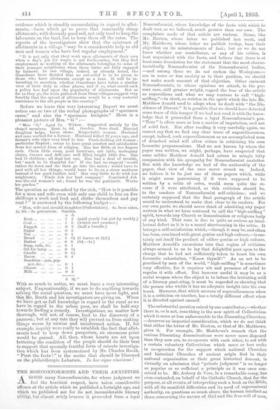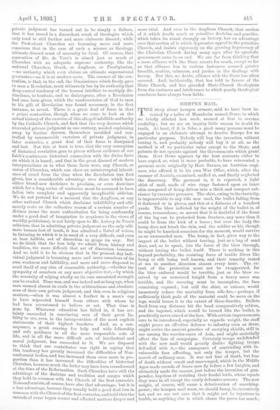THENONCONFORMISTS AND THEIR ANXIETIES.
AGOOD many Nonconformists, for whose judgment we feel the heartiest respect, have taken considerable offence at the article which we published a fortnight ago, and which we published not for its not inconsiderable literary ability, but almost solely because it proceeded from a loyal Nonconformist, whose knowledge of the facts with which he dealt was, as we believed, much greater than our own. The complaints made of that article are various. Some, like Mr. Horton, whose letter we published last week, and Mr. Matthews, whose letter we publish to-day, base their objection on its misstatements of fact; but as we do not know whether our contributor, or any of his critics, is best acquainted with the facts, and believe that there is at least some foundation for the statement that the most charac- teristically Nonconformist of the Nonconformist bodies, —and among these we do not reckon the Wesleyans,— are in more or less anxiety as to their position, we should not make much account of that objection. Other eminent Nonconformists, to whose opinions we attach, in the pre- sent ease, still greater weight, regard the tone of the article as supercilious and what we may venture to call "high- sniffing,"—in short, as written in the spirit which the late Mr. Matthew Arnold used to adopt when he dealt with "the Dis- sidence of Dissent." It is possible that we should have detected some trace of this temper if we had not read it with the know- ledge that it proceeded from a loyal Nonconformist's pen. " Tone " is often more or less a matter of imputation, and not of solid fact. But after reading it very carefully again, we cannot say that we find any clear trace of superciliousness, except, indeed, such supercilionsnesb as an accomplished man of detached mind will often evince in criticising his own favourite prepossessions. Had we not known by whom the paper was written, we might, perhaps, have suspected that some milder Matthew Arnold had arisen to mingle lofty compassion with his sympathy for Nonconformist anxieties. But with the knowledge we had of the authorship of the paper, that view of the case never struck us. Indeed, we believe it to be just one of those papers which, while it might seem patronising if it were supposed to be written by a critic ab extra, would seem quite the re- verse if it were attributed, as this criticism should be, to the candour of Nonconformist self-criticism ; and we certainly supposed that the final paragraph of the article would be understood to make that clear to its readers. For our own parts, we should never think of admitting any paper written in what we have ventured to call the " high-sniffing " spirit, towards any Church or denomination or religious body of any kind. That tone is due to quite as serious an intel- lectual defect as it is to a moral shortcoming in the oritie. It betrays a self-satisfaction which,—though it may be, and often has been, combined with great genius and high culture,—is cer- tainly not itself the product of either genius or high culture. Matthew Arnold's excursions into that region of criticism always seemed to us to lay that delightful poet open to the charge that he had not sufficiently taken to heart his own favourite exhortation, "Know thyself !" As an art to be practised by men of the world, " high-sniffing " is sometimes very effective, for it requires wit and presence of mind to repulse it with effect. But however useful it may be as a social weapon where the object is to infuse the irritating acid of a literary gnat-sting, it must be regarded as showing that the person who wields it has no adequate insight into his own heart. However, that which savours of superciliousness when it is a criticism on another, has a totally different effect when it is directed against oneself.
The substantial question raised by our contributor,—whether there is, or is not, something in the new spirit of Collectivism which is more or less unfavourable to the Dissenting Churches, —deserves an impartial consideration, which we do not think that either the letter of Mr. Horton, or that of Mr. Matthews, gives it. For example, Mr. Matthews's remark that the various Dissenting denominations were never more disposed than they now are, to co-operate with each other, to act with a certain voluntary Collectivism which more or less seeks in co-operation for the support which national Churches and historical Churches of ancient origin find in their national organisation or their great historical descent, is virtually an admission that "private judgment" is no longer so popular or so sufficient a principle as it was once con- ceived to be. Mr. Aubrey de Vere, in a remarkable essay, has even contended, on behalf of the Catholic Church, that for the purpose, at all events, of interpreting such a book as the Bible, with all its manifold difficulties and its need of supernatural authority, on questions so much above the human intellect as those concerning the nature of Go 3. and the free-will of man,
private judgment has turned out to be simply a failure, that it has issued in a discordant crash of theologies which only tend to still further and more elaborate discord; while the Protestant Churches are becoming more and more conscious that in the ease of such a science as theology, ultimate discord must of necessity be fatal. Of course, that contention of Mr. de Vere's is aimed just as much at Churches with no adequate supreme authority, like the national Churches, Greek, or Anglican, or Presbyterian, —no authority which even claims an ultimate supernatural guarantee,—as it is at modern sects. The essence of the con- tention, is that, in the end, the Omniscience which freely gave to man a Revelation, must ultimately bar by its authority that deep-rooted tendency of the human intellect to multiply dis- tinctions, to hesitate, and to disintegrate, after a Revelation had once been given, which the condescension of God to man in his gift of Revelation was found necessary, in the first instance, to arrest. There is a great deal of force in that a priori contention, though when we come to look at the actual history of the exercise of this alleged infallible authority by the Catholic Church, and find that the very decrees which overruled private judgment in one century, needed explaining away by further decrees, themselves moulded and con- trolled by innumerable exercises of private judgment, in later centuries, a great deal of that force is dissipated and lost. But this at least is true, that the very conception of historical revelation goes to pieces without evidence of our faith's continuous historical connection with the divine facts on which it is based; and that in the great discord of modern interpretations as to what those facts were, any Church, or union of Churches, which can show an uninterrupted inherit- ance of creed from the time when the Revelation was first given, has a considerable advantage over those which have either brand-new doctrines to proclaim, or even doctrines which for a long series of centuries must be assumed to have fallen into complete and apparently inexplicable oblivion. We do not pretend for a moment that the Anglican, or any other national Church which disclaims infallibility and ulti- mately rests on the collective reason of a certain number of divines (none the more authoritative for being confessedly under a good deal of temptation to acquiesce in the views of worldly politicians), is not fairly open to Mr. Aubrey de Vere's criticism, that in admitting private judgment as the only ulti- mate human test of truth, it has admitted a Babel of voices, in listening to which it is in need of a very difficult, and even at best fallible, act of discretion to grope its way. But we do think that the less help we admit from history and tradition, the more difficult that act of discretion becomes. And we hold it to be obvious that in the present day indi- vidual judgment is becoming more and more conscious of its own weakness and fallibility, and more and more disposed to avail itself of any clue of reasonable authority,—whether the sympathy of numbers or any more objective test,—by which the necessity of relying wholly on its own unassisted strength can be evaded. Time was, and was indeed not so long ago, when men seemed almost to exult in the arbitrariness and absolute- ness of their own private judgment, and this even in religious matters,—when it was almost a feather in a man's cap to have separated himself from others with whom he had been accustomed to believe or act. That time is gone by. Whatever education has failed in, it has cer- tainly succeeded in convincing men of their great lia- bility to err, even in the interpretation of the most explicit statements of their highest teachers. And, as a con- sequence, a great craving for help and wide fellowship and safeguidance in all the more responsible acts of i life, and n all ther more difficult acts of intellectual and moral judgment, has succeeded to it. We are disposed to think that our contributor was right in saying that this tendency has greatly increased the difficulties of Non- conformist bodies, and has increased them even more in pro- portion than it has increased the difficulties of historical Churches, however much the latter may have been transformed at the time of the Reformation. Such Churches have still the advantage of the doctrine and tradition and usages which i they hold n common with the Church of the first centuries. Nonconformists, of course, have also that advantage ; but it is a less advantage, because they usually hold a good deal less in common with the Church of the first centuries, and hold that the inroads of error began sooner and affected matters deeper and more vital. And even in the Anglican Church, that section of it which dwells much on primitive doctrine and practice, which takes its stand strongly on history, has an advantage over that section of it which deprecates appeal to the primitive Church, and insists vigorously on the growing degeneracy of the Christian Church during many ages after its apostolic government came to an end. We are far from thinking that a mere alliance with the State counts for much, except so far as that alliance has in various instances secured greater breadth, caution, calmness, and justice in the dealings with heresy. But this, no doubt, alliance with the State has often secured. And, incidentally, that has told in favour of the State Church, and has guarded State-Church theologians . from the rashness and intolerance to which purely theological conclaves have always been liable.



































 Previous page
Previous page